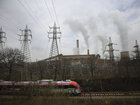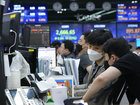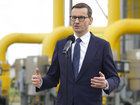Inflation in Turkey soared to nearly 70% in April, official data showed Thursday, as skyrocketing prices eat away at earnings and put even basic necessities out of reach for many households.
The Turkish Statistical Institute said consumer prices rose by 69.97% in April compared with the previous year, the biggest year-over-year increase since 2002. The annual inflation rate was up from 61.14% in March.
 Full Story
Full Story
OPEC and allied oil-producing countries decided Thursday to stick to a modest increase in production, even as Europe's proposed phaseout of Russian oil threatens to yank millions of barrels off a global market already thirsty for crude.
At an online meeting, the alliance known as OPEC+ — which includes non-member Russia — stayed with its road map to gradually open the oil taps, agreeing to add 432,000 barrels per day in June. The plan is to make those regular increases to restore cuts made in 2020 during the worst of the pandemic recession.
 Full Story
Full Story
President Nicolás Maduro and other high-ranking Venezuelan officials have met with the oil minister of Iran to discuss cooperation in energy matters and efforts to defeat economic sanctions imposed by the U.S. and its allies.
Officials from both oil-producing nations ratified agreements in this week's meetings in Venezuela, according to a statement from that country's Petroleum Ministry. Iran's delegation was led by Oil Minister Javad Owji.
 Full Story
Full Story
Across Europe, rising energy prices are testing the resolve of ordinary consumers and business owners who are caught between the continent's dependence on cheap Russian energy and its revulsion over President Vladimir Putin's invasion of Ukraine.
Governments are trying to replace energy supplies from Russia, mindful that their regular payments are funding a war that has seen thousands of civilian deaths and widespread destruction. They also face a nerve-wracking showdown with Moscow over its demands for payments in rubles, and the possibility that Russia will block supplies, as it did to Bulgaria and Poland last week.
 Full Story
Full Story
EU chief Ursula von der Leyen on Wednesday said the EU would impose a gradual Russian oil ban, as Brussels unveiled new sanctions to punish Russia for invading Ukraine.
 Full Story
Full Story
Iran's oil minister has paid an official visit to ally Venezuela to meet President Nicolas Maduro and discuss ways to "overcome" the effects of U.S. sanctions against both nations, officials said.
 Full Story
Full Story
President Michel Aoun on Sunday greeted Lebanese workers as the country marked Labor Day, pledging that he will continue to work for “transforming Lebanon’s economy from a rentier economy into a productive one.”
 Full Story
Full Story
Stocks are falling in early trading on Wall Street Friday, putting major indexes back into the red for the week after several sharp moves both up and down. The market is also heading for steep losses in April as traders fret about the tough medicine the Federal Reserve is planning to fight inflation in the form of higher interest rates, which will increase borrowing costs across the board, raising loan rates for cars, credit cards and mortgages. Bond yields rose after another hot reading on inflation, and Amazon sank 11% after reporting a rare quarterly loss. The S&P 500 fell 1.1%.
THIS IS A BREAKING NEWS UPDATE. AP's earlier story follows below.
 Full Story
Full Story
Poland's government and gas companies were attempting Friday to restore the flow of gas to some municipalities after a Russian firm halted supply when Warsaw slapped it with sanctions over Russia's invasion of Ukraine.
The supply cut was a separate development from Russia's decision earlier this week to stop gas deliveries to Poland.
 Full Story
Full Story
Elon Musk has sold 4.4 million shares of Tesla stock worth roughly $4 billion, most likely to help fund his purchase of Twitter.
Musk reported the sale in a filing with the Securities and Exchange Commission on Thursday. The shares were sold over the past few days, at prices ranging from $872.02 to $999.13.
 Full Story
Full Story



